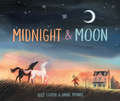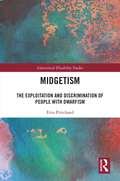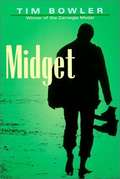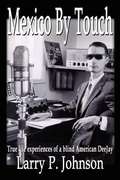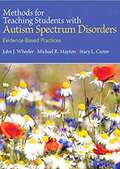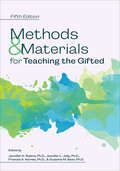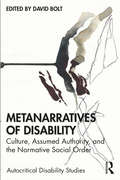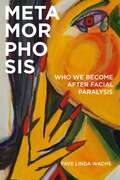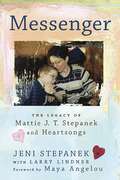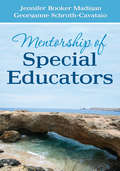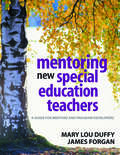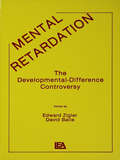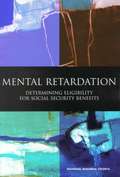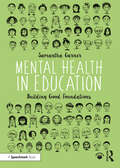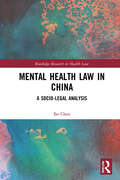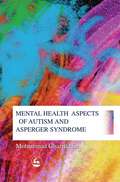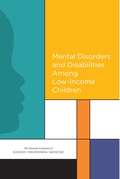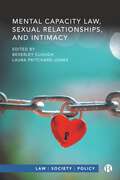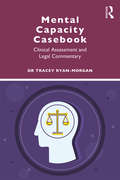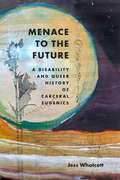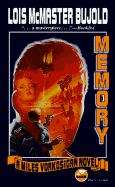- Table View
- List View
Midnight and Moon
by Kelly CooperA girl who doesn't fit in befriends a blind horse who also struggles to find his place in the herd. A beautiful picture book that helps readers celebrate the qualities that challenge us and make us different.Moon cannot see but he hears sounds that other horses ignore: the eggshell crack of a meadow lark hatching. The glide of a salamander into the pond. Clara does not speak but she hears sounds that other children ignore: the hum of the oven when her mother bakes muffins. The sound of the cat's paws on the kitchen floor.Both the foal and the little girl live with challenges. Both also have special qualities, which are recognized by friends who are open to seeing them. Midnight and Moon is about the rare and wonderful friendship that can form between opposites, a friendship that enriches both. This story shows us that our differences are positives, that the world needs both Claras and Jacks, Midnights and Moons.
Midgetism: The Exploitation and Discrimination of People with Dwarfism (Autocritical Disability Studies)
by Erin PritchardThere exist problematic attitudes and beliefs about dwarfism that have rarely been challenged, but continue to construct people with dwarfism as an inferior group within society. This book introduces the critical term ‘midgetism’, which the author has coined, to demonstrate that the socio-cultural discrimination people with dwarfism experience is influenced by both heightism and disablism. As a result, it unpacks and challenges the problematic social assumptions that reinforce midgetism within society, including the acceptability of ‘midget entertainment’ and ‘non-normate space’, to demonstrate how particular spaces can either aid in reinforcing or challenge midgetism. Drawing on the tripartite model of disability, this book demonstrates how midget entertainment is framed as a non-normative positivism, which makes it an acceptable form of employment. Using autocritical discourse analysis, the book exposes, examines and responds to excuses that are used to reinforce midgetism, thus critiquing the numerous beliefs influenced by cultural representations of dwarfism, such as people with dwarfism being acceptable figures of entertainment. It will be of interest to all scholars and students of disability studies, social history, sociology and cultural geography.
Midget
by Tim BowlerSubject to strange fits, physically abnormal, and psychologically disturbed from the constant torment and abuse of his older brother, fifteen-year-old Midget finds himself in control of his life for the first time when he gets his own sailboat and discovers untapped mental powers.
Mexico by Touch: True Life Experiences of a Blind American Deejay
by Larry P. Johnson<P>My memories of Mexico are a montage of flavors, fragrances, sounds and sensations. <P>There's nothing that can compare with the smell and taste of freshly made corn tortillas just before the mid-day meal. Nor are there many sounds more soothing and ethereal than the rippling melodies of a neighborhood marimba band playing a dawn serenade.
Methods for Teaching Students With Autism Spectrum Disorders: Evidence-Based Practices
by Stacy L. Carter John J. Wheeler Michael R. MaytonMethods for Teaching Students with Autism Spectrum Disorders is the most comprehensive text available, aimed at helping pre-service and in-service teachers and related service professionals understand the importance of evidence-based practices in the education of learners with Autism Spectrum Disorders (ASD) from a family and longitudinal learning perspective. <p><p>With its emphasis on the theme of family and professional partnerships and collaboration and consultation, the book includes learning aids such as suggested print and web-based resources, graphic organizers, and points for reflection; child and family vignettes, “Consider This” features, and examples of exemplary programs and practices; and the most up-to-date information and latest trends in the field.
Methods and Materials for Teaching the Gifted (Other Ser.)
by Jennifer Jolly Jennifer RobinsThe completely revised and updated fifth edition of Methods and Materials for Teaching the Gifted:Provides a comprehensive examination of the most current research and best practices in the field of gifted education.Addresses identification, twice-exceptionality, and culturally and linguistically diverse learners.Includes chapters related to designing curriculum and differentiating instruction.Covers developing critical and creative thinking, as well as encouraging talent development.Features chapter authors who are recognized researchers, practitioners, and leaders in the field of gifted education.The chapters are organized to promote critical thinking and discussion about each topic. This text is a complete resource curated for a wide range of K-12 educators and those working with inservice and preservice educators and administrators.
Metanarratives of Disability: Culture, Assumed Authority, and the Normative Social Order (Autocritical Disability Studies)
by David BoltThis book explores multiple metanarratives of disability to introduce and investigate the critical concept of assumed authority and the normative social order from which it derives. The book comprises 15 chapters developed across three parts and, informed by disability studies, is authored by those with research interests in the condition on which they focus as well as direct or intimate experiential knowledge. When out and about, many disabled people know only too well what it is to be erroneously told the error of our/their ways by non-disabled passers-by, assumed authority often cloaked in helpfulness. Showing that assumed authority is underpinned by a displacement of personal narratives in favour of overarching metanarratives of disability that find currency in a diverse multiplicity of cultural representations – ranging from literature to film, television, advertising, social media, comics, art, and music – this work discusses how this relates to a range of disabilities and chronic conditions, including blindness, autism, Down syndrome, diabetes, cancer, and HIV and AIDS. Metanarratives of Disability will be of interest to all scholars and students of disability studies, medical sociology, medical humanities, education studies, cultural studies, and health.
Metamorphosis: Who We Become after Facial Paralysis
by Faye Linda WachsLosing her smile to synkinesis after unresolved Bell’s palsy changed how Faye Linda Wachs was seen by others and her internal experience of self. In Metamorphosis, interviewing over one hundred people with acquired facial difference challenged her presumptions about identity, disability, and lived experience. Participants described microaggressions, internalizations, and minimalizations and their impact on identity. Heartbreakingly, synkinesis disrupts the ability to have shared moments. When one experiences spontaneous emotion, wrong nerves trigger misfeel and misperception by others. One is misread by others and receives confusing internal information. Communication of and to the self is irrevocably damaged. Wachs describes the experience as a social disability. People found a host of creative ways to reinvigorate their sense of self and self-expression. Like so many she interviewed, Wachs experiences a process of change and growth as she is challenged to think more deeply about ableism, identity, and who she wants to be.
Messenger: The Legacy of Mattie J. T. Stepanek and Heartsongs
by Jeni Stepanek Larry LindnerIn Messenger, Jeni Stepanek shares the inspiring story of her son's life. Mattie was born with a rare disorder called Dysautonomic Mitochondrial Myopathy, and Jeni was advised to institutionalize him. Instead, she nurtured a child who transformed his hardships into a worldwide message of peace and hope.
Mentorship of Special Educators
by Jennifer C. Madigan Georganne S. Schroth-CavataioThe definitive guide for mentoring special education teachers <p><p> The national shortage and high attrition rate of special education teachers are impediments to serving students with special needs. This book helps meet an essential need for attracting, retaining, and supporting special educators. The authors provide a wealth of research-based tools for professional developers to use in multiple settings, including schools with culturally and linguistically diverse students.
Mentoring New Special Education Teachers: A Guide for Mentors and Program Developers (1-off Ser.)
by Mary Lou Duffy Dr James W. ForganHow do you avoid the high cost of turnover and retain high-quality special education teachers in such a demanding field? Special education teachers are leaving the field at twice the rate of general education teachers. Why? Mentoring New Special Education Teachers will help administrators and other educators develop and sustain effective mentoring programs specifically designed for special education teachers, providing practical, field-tested activities and resources for both the mentors and the mentees, including such critical elements as: Effectively identifying, recruiting, and selecting mentors Action planning Evaluating progress Addressing diminishing support Dealing with burnout and isolation Vignettes of real-life mentoring experiences Figures, tables, appendices, and Web sites A ready-to-use two-day workshop for training mentors
Mentoring New Special Education Teachers: A Guide for Mentors and Program Developers (1-off Ser.)
by Mary Lou Duffy Dr James W. ForganHow do you avoid the high cost of turnover and retain high-quality special education teachers in such a demanding field? Special education teachers are leaving the field at twice the rate of general education teachers. Why? Mentoring New Special Education Teachers will help administrators and other educators develop and sustain effective mentoring programs specifically designed for special education teachers, providing practical, field-tested activities and resources for both the mentors and the mentees, including such critical elements as: Effectively identifying, recruiting, and selecting mentors Action planning Evaluating progress Addressing diminishing support Dealing with burnout and isolation Vignettes of real-life mentoring experiences Figures, tables, appendices, and Web sites A ready-to-use two-day workshop for training mentors
Mental Retardation: The Developmental-difference Controversy
by Edward Zigler David BallaPublished in 1983, Mental Retardation is a valuable contribution to the field of Education.
Mental Retardation: Determining Eligibility For Social Security Benefits
by Committee on Disability Determination for Mental RetardationCurrent estimates suggest that between one and three percent of people living in the United States will receive a diagnosis of mental retardation. Mental retardation, a condition characterized by deficits in intellectual capabilities and adaptive behavior, can be particularly hard to diagnose in the mild range of the disability. The U.S. Social Security Administration (SSA) provides income support and medical benefits to individuals with cognitive limitations who experience significant problems in their ability to perform work and may therefore be in need of governmental support. Addressing the concern that SSA’s current procedures are consistent with current scientific and professional practices, this book evaluates the process used by SSA to determine eligibility for these benefits. It examines the adequacy of the SSA definition of mental retardation and its current procedures for assessing intellectual capabilities, discusses adaptive behavior and its assessment, advises on ways to combine intellectual and adaptive assessment to provide a complete profile of an individual's capabilities, and clarifies ways to differentiate mental retardation from other conditions.
Mental Health in Education: Building Good Foundations
by Samantha GarnerMental health and well-being are becoming increasingly important areas of focus in education, yet schools often find themselves lacking the tools, time and resources to tackle the issues. Mental health support is frequently seen as an additional responsibility of the school setting, rather than a core aspect of it. This practical, fully accessible book provides straightforward guidance and low-budget strategies to help school settings get mental health support right. With a focus on the well-being of both students and staff, chapters focus on techniques to develop self-esteem, manage behaviour and build positive relationships at all levels. Key features include: low-cost and easy-to-implement strategies suitable for the busy classroom environment, as well as whole school approaches downloadable activities and planning sheets based on cognitive behavioural therapy techniques a focus on building strong foundations based on mental health basics Refreshingly honest and conscious of the realities of the school environment, this book is a crucial tool for anybody working within education.
Mental Health Law in China: A Socio-legal Analysis (Routledge Research in Health Law)
by Bo ChenThis book provides an important critique of mental health law and practice in China, with a focus on involuntary detention and treatment. The work explores China’s mental health law reform regarding treatment decision-making in the new era of the UN Convention on the Rights of Persons with Disabilities (CRPD). It adopts a socio-legal approach, not only by undertaking a comprehensive desk-based analysis of the reforms introduced by China’s Mental Health Law (MHL) but also examining its implementation based on evidence from practice. The book seeks to investigate whether China’s first national MHL takes a step closer to the requirements of the UN Convention on the Rights of Persons with Disabilities on mental health treatment decision-making, and, if not, why not? The book will be of interest to those working in the areas of mental health law and policy, medical law and disability, human rights law, and Asian Studies.
Mental Health Aspects of Autism and Asperger Syndrome
by Mohammad GhaziuddinThe first book to address the increasingly urgent need for information about psychiatric problems in people with autism spectrum disorders (ASDs), Mental Health Aspects of Autism and Asperger Syndrome systematically explains the emotional and psychological difficulties that are often encountered with ASDs. The author, an experienced psychiatrist specializing in autism, describes each of the conditions that are commonly seen in autistic children and adults, including schizophrenia, depression, anxiety, and tic disorders, and gives sound guidance on their early detection and treatment. Easy to use and authoritative, this book is an essential tool for use by both family and professionals.
Mental Disorders and Disabilities Among Low-Income Children
by Thomas F. BoatChildren living in poverty are more likely to have mental health problems, and their conditions are more likely to be severe. Of the approximately 1. 3 million children who were recipients of Supplemental Security Income (SSI) disability benefits in 2013, about 50% were disabled primarily due to a mental disorder. An increase in the number of children who are recipients of SSI benefits due to mental disorders has been observed through several decades of the program beginning in 1985 and continuing through 2010. Nevertheless, less than 1% of children in the United States are recipients of SSI disability benefits for a mental disorder. At the request of the Social Security Administration, "Mental Disorders and Disability Among Low-Income Children" compares national trends in the number of children with mental disorders with the trends in the number of children receiving benefits from the SSI program, and describes the possible factors that may contribute to any differences between the two groups. This report provides an overview of the current status of the diagnosis and treatment of mental disorders, and the levels of impairment in the U. S. population under age 18. The report focuses on 6 mental disorders, chosen due to their prevalence and the severity of disability attributed to those disorders within the SSI disability program: attention-deficit/hyperactivity disorder, oppositional defiant disorder/conduct disorder, autism spectrum disorder, intellectual disability, learning disabilities, and mood disorders. While this report is not a comprehensive discussion of these disorders, "Mental Disorders and Disability Among Low-Income Children" provides the best currently available information regarding demographics, diagnosis, treatment, and expectations for the disorder time course - both the natural course and under treatment.
Mental Capacity Law, Sexual Relationships, and Intimacy (Law, Society, Policy)
by Karen Brennan Andrea Hollomotz Alex Ruck Keene Hannah Morgan Ralph Sandland Claire Bates Neil Allen Jaime Lindsey Allegra Enefer Alan Cusack Becky Squires Oluwatoyin Sorinmade Carmelle Peisah Lorraine CurrieQuestions as to the mental capacity of an individual to consent to sex are an increasingly important aspect of legal scholarship and professional practice for those working in care. Recent case law has added new layers of complexity, requiring that a person must be able to understand that the other person needs to consent and can withdraw that consent. While this has been welcomed for asserting the importance of the interpersonal dynamics of sex, it has significant implications for practice and for the day-to-day lives of people with cognitive impairments. This collection brings together academics, practitioners and organizations to consider the challenges posed by the current legal framework, and future directions for law, policy and practice.
Mental Capacity Casebook: Clinical Assessment and Legal Commentary
by Tracey Ryan-MorganThe Mental Capacity Act 2005 (MCA) provides a legal framework for acting on behalf of individuals who lack the capacity to make decisions for themselves. The Mental Capacity Casebook showcases numerous real-life case studies in accordance to this Act. Through the exploration of various mental capacity assessments, this book highlights the psychological needs of the individuals who are supported and protected by the MCA. Dr. Tracey Ryan-Morgan, a Consultant Clinical Neuropsychologist, is the first to bridge the gap between the individual’s psychological requirements and the legal framework surrounding them. Not only does this book present true, often complex, mental capacity assessments, it does so with legitimate corresponding commentaries. Each case outlines the presented problem along with its background, social context, psychological matters, the overriding opinion and concluding learning points. This book provides a unique standpoint, offering insight into the complexities of the Act and practical guidance on how to conduct assessments. It serves as essential reading for those looking for guidance whilst making complex capacity decisions, such as Clinical Neuropsychologists, Social Workers, and Legal Professionals.
Mended Wheels
by Ann Bell Judy SagalChristian romance set in Missouri in which one of the main characters is disabled.
Menace to the Future: A Disability and Queer History of Carceral Eugenics
by Jess WhatcottIn Menace to the Future, Jess Whatcott traces the link between US disability institutions and early twentieth-century eugenicist ideology, demonstrating how the legacy of those ideas continues to shape incarceration and detention today. Whatcott focuses on California, examining records from state institutions and reform organizations, newspapers, and state hospital museum exhibits. They reveal that state confinement, coercive treatment, care neglect, and forced sterilization were done out of the belief that the perceived unfitness of disabled, mad, and neurodivergent people was hereditary and thus posed a biological threat—a so-called menace to the future. Whatcott uncovers a history of disabled resistance to these institutions that predates disability rights movements, builds a genealogy of resistance, and tells a history of eugenics from below. Theorizing how what they call “carceral eugenics” informed state treatment of disabled, mad, and neurodivergent people a century ago, Whatcott shows not only how that same logic still exists in secure treatment facilities, state prisons, and immigration detention centers, but also why it must continue to be resisted.
Memory (Miles Vorkosigan #10)
by Lois Mcmaster BujoldEven after Miles returns to military duty, his late death seems to be having a greater effect than he's willing to admit. His weakness reveals itself to the world at large at just the wrong time and in just the wrong way, and Miles is summoned home to face the Barrayarn Imperial Security chief.
Memoirs of a Midget
by Walter de la Mare"It is true that my body ranks among the smaller works of God," writes Miss M., the narrator of this novel, as she reflects on a recent newspaper story about her. She goes on to note that the reporter "spared any reference not only to my soul ... but also to my mind and heart." Orphaned at twenty, Miss M. leaves her sheltered home in the English countryside to make her way in the world. The novel focuses on the events of one turbulent year in her life, filled with passion and heartbreak as Miss M. gains a deeper understanding of the world and of herself. Keenly observant of human nature, this book reveals an unusual awareness of disability issues for its time - it was originally published in 1922. It is regarded by some critics as a minor classic of twentieth-century English literature.

